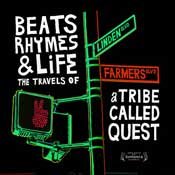I can trace my entire life as a music lover back to one group that I first heard in 8th grade: A Tribe Called Quest. Of course, I had heard other music before that. When I was 8, I thought that Bon Jovi ruled the world. At 11, I listened to the group N.W.A. after school with my friends; and by the time I was 12, I was well aware of Public Enemy. But it wasn't until the first time that I heard Q-Tip, Phife, Ali Shaheed Muhammad and Jarobi that I became consciously aware of music to the point that it would become a defining factor in my life.
Even with such a close relationship to the music, I lacked a detailed understanding of the group, like many other fans, especially the behind the scenes tensions. ATCQ is one of those groups who seemed to transcend everything because of the passion and emotion that their fans put into them—not necessarily as the people in ATCQ, but as a movement. Tribe represented everything that the left field of hip-hop embodied and, as such, the fans viewed the members in almost cult-like status. For many, they could do no wrong.
Looking back, I now understand why this is dangerous, not just as a fan, but also to a group that unwillingly comes to carry the abstract ideals of an entire fan base.
That is why I was so excited to hear earlier this year that actor Michael Rappaport was producing a documentary film on Tribe, "Beats, Rhymes and Life: The Travels of A Tribe Called Quest." After a run on the film festival and independent cinema circuit (The Mississippi Film Institute featured the film as part of its Arthouse Cinema series at Davis Planetarium Oct. 2), "Beats, Rhymes and Life" was finally available on DVD and Blu-Ray Oct. 18.
I have seen the film several times since screeners began to pop up this summer, and every viewing is as inspiring and sad as the previous. "Beats, Rhymes and Life" is part career retrospective and history and part psychological analysis of the group's break up. Like other fans, I had always wondered what exactly could have forced the perfect hip-hop group to break up. I wanted to know whose side, Tip or Phife, I needed to spend the rest of my life defending.
The film does not offer such easy distinctions. You learn that Phife's debilitating battle with diabetes as well as Q-Tip's ego were both contributing factors. It's almost impossible to take sides, because you can blame and, more importantly, sympathize with each man. For his first film and being an admittedly big fan of ATCQ, Rappaport did a great job showing both sides and being respectful to the group.
"Beats, Rhymes and Life" will not answer all of your questions, but it doesn't really leave you asking too many more, either. As I think the film shows, A Tribe Called Quest shouldn't be reduced to an argument over whom to blame for a less-than-amicable break up. Instead, a group this important should be remembered for what they did while together.
The best scene in the film shows Q-Tip playing the record with the original drum beat sample for "Can I Kick It?" Even 20 years after the song's release, Tip's eyes still light up like a child's. The look on his face in hearing the perfect break beat is priceless. That is how I will always remember A Tribe Called Quest. I am just glad I could join in on the ride.
Visit http://www.sonyclassics.com/beatsrhymesandlife to watch a film trailer.
This documentary examines the demise of the 1990s rap group, A Tribe Called Quest.
Courtesy Sony Pictures Classic



Comments
Use the comment form below to begin a discussion about this content.
comments powered by Disqus